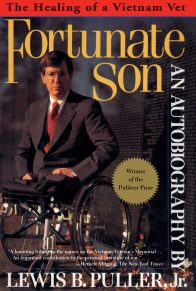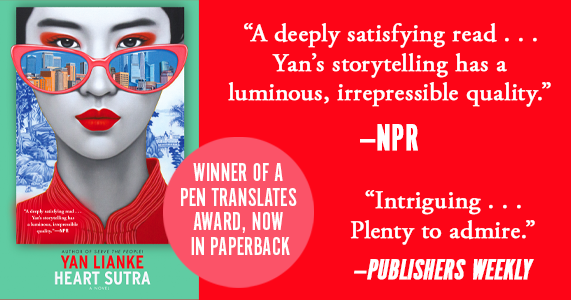The circle of the story is nearly complete today, Thursday, October 19, 1996. I’m in the Noi Ba Hotel, twelve kilometers from Hanoi and five hundred yards from the Noi Ba Airport. I am almost comfortable enough with my fate to write this all down.
Much to the delight of the hotel staff who have seen many like me come and go quickly, I’ve renamed this place the “No Visa Hotel” because this is where the airport security people put travelers who arrive at the airport without a proper visa until they can be put on the next available flight to Hong Kong, Kuala Lumpur, Singapore, Bangkok; anywhere, as long as it is out of Hanoi, out of Vietnam.
In spite of a large sign inside the airport that said VISA ISSUED HERE, there were no visas issued at the Noi Ba, not ever.
I was escorted to the hotel by two Vietnamese friends: the poet Pham Tien Duat, who served as a soldiers’ poet in the Army of North Vietnam during the long war against the Americans, traveling up and down the Ho Chi Minh Trail, writing and reciting poems for the soldiers; and Nguyen Quang Thieu, a young poet and novelist who, during the war, was a child living in the same village he lives in today, not far from Hanoi. Thieu had become one of the most important writers of the post-1975 generation. Also present was Lady Borton, a writer, activist and field coordinator for the American Friends Service Committee in northern Vietnam.
Our official escort was an airport security officer who seemed uncomfortable with his task. I know now that he was aware they would force me to leave; he saw that I had a few well-known and highly regarded friends from Hanoi and this contradiction made him uneasy. He was polite to me, even kind when he told me I could not leave the hotel grounds without a visa. When I asked him who would stop me if I did try to leave, he seemed perplexed and asked my Vietnamese colleagues why I would want to leave after he told me I couldn’t. I didn’t want to make him any more uncomfortable so I told him I was joking. He laughed out loud, clearly relieved, slapped me on the back, and left.
But I’ve gone too far ahead. I should begin this part of the story with my arrival and attempted departure from Hong Kong this same morning.
2
I arrived in Hong Kong via Seoul via New York’s JFK Airport at 12:30 P.M. Hong Kong time, after more than eighteen hours of flying. My connection to Hanoi, a short flight of only an hour and a half, wouldn’t depart until 2:45 P.M. and I was relieved to have a few hours to get my boarding pass, collect myself for the journey ahead and get some rest. I cleared customs quickly and set out to find the Cathay Pacific desk.
Following signs in English, I came around a corner to a wild mob scene. The hallway, about fifty feet long, was crammed with hundreds of people, mostly Asians: Vietnamese, Chinese, Japanese, Korean and Thai, all talking loud and fast and at the same time. Mid-October in Hong Kong is not unlike mid-July in Georgia, and without air-conditioning or fans, the hallway was like a sauna. Even my Asian fellow travelers, more used to the heat than I, were wiping the sweat from their brows and fanning themselves with their tickets and official papers.
It took a few minutes to realize that what had first appeared to be a random coming together of people crammed into the long hallway was actually a line. Without cutting in I tried to make my way to the front of the line to see what was holding things up and if I had to wait, as the others seemed to be doing, only to get my boarding pass. At the end of the hallway I rounded another corner to find one more hallway crammed with people. Because I am tall even in my own country, I could see over the crowd to the end of this second hallway, where I could make out the Cathay Pacific sign hung above a long counter. There were nine stations at the counter; at each station, separated from the mass of noisy travelers by a counter and a glass barrier, a Chinese man or woman stood coolly handling those fortunate enough to have made it to the counter, travelers who each seemed to have endless questions.
As I watched for a few minutes trying to decide what to do, I got lost for a moment in the confusion at the counter and in my brain. I let my mind go where it would, and it took me with an almost jarring inevitability to the day two years earlier when my wife and I had finally decided to adopt a Vietnamese child.
I could see the moment as clearly as if I were inside it, and I could feel the weight of that decision as it had felt that day: a joyful and terrifying weight, a promise made to a child who, although she had remained unknown to us for almost two years, could never be betrayed now. I remembered my sense that once we had taken that first step towards her by agreeing that we wanted to do this, there would be no turning back no matter what. I remembered our long wait while the adoption service tried to find a child they felt was a good match. After the first six months we thought it would never happen. I grew more and more impatient as I imagined this girl-child in an orphanage somewhere in northern Vietnam. I had traveled to the North many times since the late 1980s, first as a curious and frightened veteran trying to find the boy I had been in the war–to find what it was I imagined I had left there–and then as a writer and translator of Vietnamese poetry. I had visited more than one orphanage, and although they were better than one might expect–clean, and sometimes even happy with the voices of children singing–they were also frighteningly poor and understaffed. I could tell that sometimes the children did not have enough to eat.
During the months we had waited to hear from the adoption service, I would lie awake at night and picture those places, and imagine the girl. I was restless and sometimes angry at the agency for not moving more quickly, and I blamed them for the meals she would miss, the cold nights she would spend, simply because they wouldn’t allow me to go to Vietnam and bring her home.
I had been fortunate enough to make many close and loving friends in Vietnam, especially in and around Hanoi, where I spend most of my time while there. They were mostly writers who were also veterans of the American and the French wars, and they provided me resources that even the Hanoi office of the adoption agency didn’t have. Writers in Vietnam are highly regarded and usually well connected both socially and politically. I decided to ignore the agency’s advice to stay out of the process, and called on some of those friends for help.
I wrote a series of letters to people who were connected to the ministry that could help me in Hanoi. Less than a month after I’d given the letters to a friend who was traveling to Hanoi, my wife called me at my university office. She was at home with the social worker, who had with her a picture of an eight-year-old girl. My wife told me over the phone that the social worker wanted to know if we would adopt her. I hung up and drove wildly home. When I arrived, the social worker was getting ready to leave; she was handing my wife the dossier with the girl’s story and pictures. She was telling my wife and then me as I came in the door to take our time, to think carefully after we’d read the dossier.
I looked at Jean and we both looked at the social worker and I said we didn’t have to wait. Jean was holding a small photograph of a tiny girl dressed in a pink flowered pajama outfit. Although she was fighting not to smile, she was as pretty as a river where the moon has fallen.
3
A man pushing me from behind brought me back to the desk among my anxious fellow travelers. I looked towards the row of faces behind the glass and chose one I thought might help me. I approached a woman clerk but she said, “You’ll have to wait your turn.”
I excused myself as well as I could and interrupted her, saying I’d be happy to wait but that I simply needed a boarding pass for my flight to Hanoi, and only wondered what line I should be in.
She pointed to the mass of people milling around in front of the counter. I knew that mass spilled into the second hallway, which connected to the first hallway with its own population of weary travelers.
“That line,” she said.
When I tried to ask her another question she smiled, dismissed me with a not unfriendly wave of her hand and turned to the man before her who was waving a handful of papers.
I made my way back down the two hallways to the end of the line, which had already grown longer by twenty or thirty people. I looked at my watch. It was 1:00 P.M., and though the line seemed to hardly move at all, I still felt I’d have no trouble making my flight as it didn’t depart for another hour and forty-five minutes.
I settled into the line, which did not advance but got longer. I spread my bags out to make a nest and sat down on them like the many others around me. A Chinese man next to me smiled his approval and offered me a cigarette. He lit my cigarette with a Zippo lighter and flicked it shut all in one motion the way they do in American movies. I inhaled deep and smiled back at him.
He asked in English where I was going and said, “Oh, very bad place” when I told him Hanoi. I wasn’t up for that conversation, so I shook my head half yes and half no and turned as if to look in my backpack.
My new friend wouldn’t have it. He had shared his cigarettes with me, and he had lit me up with his Zippo and now he felt I owed him some English practice.
“Hanoi is Comoonist,” he said.
I told him I wasn’t a politician, and that I wasn’t going to Vietnam for political reasons–partly a lie–but that I was going to adopt an eight-year-old girl from an orphanage in northern Vietnam.
My friend turned to a woman next to him whom I took to be his wife. He must have told her what I had just told him because his wife looked at me, smiled and half bowed her approval.
My friend frowned at her.
“Why you want Vietnamese girl,” he said.
“Why not,” I answered.
He laughed. “Hanoi is Comoonist,” he said. “No good, girl from there.”
The line suddenly lumbered to its feet like an elephant and moved five or six short steps down the hallway before coming to a full stop again. When I settled back down, I managed to put some people between me and my friend. He waved at me once he’d settled too, and he shook his head. Since it was so noisy you had to shout to be heard, he mouthed the words Hanoi is Comoonist once more so I could read his lips, and turned away.
4
Two years earlier, looking at the picture of Nguyen Thi Hanh that my wife held and reading the vital statistics of the little girl’s life, I had imagined a river that ran straight from my door across the thousands of miles to her side. I had imagined that nothing could stop me from bringing her into our lives. Waiting in line, I resolved that this otherworldly airport scene would not deter me from that task. I felt a sudden, sharp loneliness sitting there with all those other people, and I longed to be at Nguyen Thi Hanh’s side in Binh Luc, Nam Ha Province. I looked ahead at the sloppy line and down at my watch. Nothing would stop me from getting to Hanoi today and to Binh Luc tomorrow for my daughter.
I practiced the Buddha’s first meditation and moved with the line when it moved.
There were only thirty-five minutes left before boarding when I finally reached the desk, but I could see the gate from where I stood, and I could not imagine that I wouldn’t make the flight. Even if approval took longer than I thought it would, I told myself, once they found out at the desk that I held a ticket for the Hanoi flight, they’d hold the plane for me. I was almost there.
I presented my papers–passport with Vietnamese visa, stamped inside by the Vice-Ambassador himself forty-eight hours earlier, and Cathay Pacific/Air Vietnam ticket–to a Chinese woman behind the glass barrier. She smiled at me, took my documents and began to process them.
Then she stopped suddenly in such a way that I knew some great impossibility was about to overtake me, and that there was nothing I could do to prevent it.
She frowned at me, openly, glaringly, and said, “Please, wait one moment.” She walked away from the counter to speak to another Chinese woman whom I saw almost immediately shake her head as she listened to what the counter woman had to say. I looked down at my watch; five more minutes had gone by.
The counter woman returned and said without emotion, “I’m sorry, we cannot issue you a boarding pass to Hanoi because your visa has expired.”
I was relieved because I knew she had to be wrong, and since she was wrong it was something we could fix. With twenty-five or thirty minutes left, there was still plenty of time.
“That’s impossible,” I said. “I was only issued the visa two days ago by Vietnam’s Vice-Ambassador to the United States in Washington, and I’ve been traveling for twenty-four hours.”
“Your visa expired yesterday,” she said, and handed my passport back to me through the small opening in the glass.
“I was only issued my visa yesterday,” I said, `”that’s impossible.”
“Look at the date,” she said, and told me to stand to the side so others could approach the counter.
I found the visa and strained to read the ink-stamped seal with the dates of issue and expiration. I knew she had to be wrong. But she wasn’t. I saw that the expiration date was in fact yesterday, and that perhaps in his haste to get the visa to me in time, the Vice-Ambassador or one of his aides had reversed the issue and expiration dates so the visa actually indicated that it had been issued thirty days in the future and expired on the day it was issued. I panicked for a minute after looking at my watch: no more than twenty minutes until the scheduled departure, and I worried that they were issuing too many boarding passes, given the number of travelers already gathering at the gate.
I approached the counter woman again when I could find an opening and said, “See, there’s been a mistake,” but she waved me off.
“I’m sorry, there’s nothing we can do. The date of expiration shows that the visa has already expired.”
“But can’t you see that it’s a mistake,” I said, “that they’ve reversed the two dates?”
“We are instructed to issue boarding passes for Hanoi only to those passengers traveling with a valid Vietnamese passport or with an official and legal visa from the People’s Republic of Vietnam. I’m sorry,” she said, “you’ll have to get another visa.”
I saw the opening in the mass of people leading to the departure gate get smaller.
“Where can I get another visa to Vietnam?” I asked.
“Perhaps you can get one here in Hong Kong, or perhaps in Singapore, or perhaps it’s best for you to return home and get a new visa there.”
I tried to tell her that I couldn’t do that, that I was on a very tight schedule and that at the end of the schedule and the convoluted paperwork trail a little girl waited for me, but she was already busy with another customer.
“Please,” I said, “let me speak to your supervisor.”
She frowned again, and called over the woman she’d spoken to earlier.
“Can I please speak to you about this problem?” I asked.
“There’s nothing we can do,” she said, “you must have a valid visa in order to receive a boarding pass to Hanoi.”
“But can’t you see they’ve made a simple mistake?” I said. I pointed to the dates and explained to her carefully that the Vice-Ambassador must have inverted the two dates. She shook her head.
“Perhaps that is what happened,” she granted me, “but how do I know that? Perhaps the visa is actually expired. Perhaps they really don’t want you to come to Hanoi.”
“Why would you say that?” I asked.
“Because we have many problems with these visas issued in the United States for Vietnam.”
I told her a very brief story of Hanh, how she was waiting, and how it all depended upon me leaving for Hanoi this afternoon in less than fifteen minutes. Surely this woman could help me.
“There’s nothing I can do,” she said, “but you can speak to the Vietnamese representative for the airline.”
I sighed some relief. I thought someone with authority from the Vietnamese side surely could help.
“Yes,” I said. “Please let me speak to him.”
“He’s not here now,” she said, “but here is his cell phone number, you can call him. I think he should be on his way to the airport now.”
5
I made my way through the crowd to a kind of telephone I’d never seen before. The instructions explaining how to use the phone were in Chinese and an English that made absolutely no sense to me. I looked frantically around for help but realized it was useless. There were odd slots for coins that I did not have and additional slots for special phone cards. There wasn’t time to investigate so I picked up the receiver and dialed the cell phone number. I was shocked to hear what sounded like a connection being made; then a busy signal.
I dialed again and again and each time heard a series of odd clicks followed by the irritating international busy signal I’d heard so often over the years when I’d tried to call Hanoi from the U.S. I wasn’t sure if the number was in fact busy or if I was dialing the phone incorrectly. I looked around again for help and dialed once more, expecting nothing more than the same noisy nonconnection, when suddenly a man answered.
He listened to a quick explanation of my problem. I wanted to believe that he sounded sympathetic. He told me that he was actually in the airport and that he’d be at the desk in a few minutes. I relayed this to the supervisor who only shook her head and turned away.
I had sweat through my shirt, and my kidneys, which I’d had problems with in the months preceding my trip, were beginning to ache and I worried that I’d get dehydrated and have more problems, even another stone. I tried to control my breathing, to calm myself and to think my way through the problem that threatened to swallow me whole.
©2000 by Bruce Weigl. Reprinted with permission from Grove Atlantic, Inc. All rights reserved.















